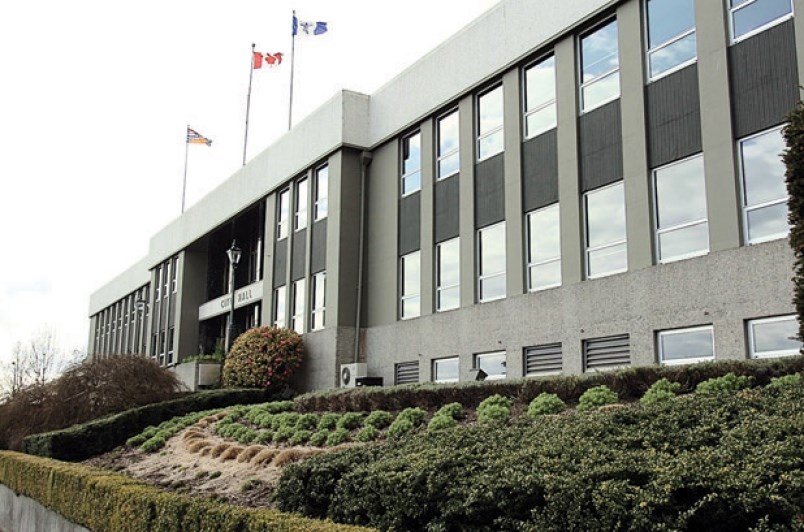How do you conduct business as a public body when you can’t invite the public in to take part?
That’s the question New Westminster city council is pondering in the face of the COVID-19 pandemic.
During a special COVID-19-related meeting held Monday (March 23), councillors voted to amend the city’s procedure bylaws to allow meetings to take place electronically during an emergency.
They also agreed to a series of recommendations from staff designed to address the concerns about public gatherings in the face of the pandemic. Among those:
- suspending open delegations, public presentations and presentation of proclamations for the duration of the COVID-19 pandemic;
- suspending the submission of notices of motion from councillors during the period of the pandemic;
- cancelling the scheduled March 30 public hearing and all future public hearings during the pandemic; and
- strictly limiting the number of people in physical attendance at council chambers to comply with social distancing rules by widely advertising electronic participation. (This is a time-limited amendment to allow the city to deal with a required two-week legal waiting period before the new procedure bylaw allowing electronic meetings is adopted.)
City clerk Jacque Killawee told council that currently, by law, the city must allow public access to open council meetings.
“It’s very important, with the legislation, that we allow members of the public who want to attend this meeting to attend this meeting, while informing them it’s best not to for safety reasons,” she said.
Killawee noted council chambers can only accommodate 20 seats when allowing for social distancing, and some of those seats are needed for staff, so the maximum number of members of the public who can be on hand is 10.
Councillors expressed support for limiting the number of people allowed in council chambers.
The procedural change to allow electronic meetings was also uncontroversial, but councillors had mixed feelings about the other recommendations.
Coun. Chuck Puchmayr raised concern about suspending councillors’ ability to submit notices of motion, which are a way for councillors to serve notice that they intend to bring a particular suggestion forward at a future meeting. He said some issues councillors want to raise may be of a “life or death” nature and they need to have some way to bring those forward.
Coun. Jaimie McEvoy also had reservations about the suggestion.
“I really don’t want to impact the democratic process unless it’s necessary to the emergency,” he said, adding he needs to see a connection between suspension of notices of motion and the health emergency.
Killawee explained the recommendation about notices of motion stems from the fact that such notices always attract people out to council meetings. She said New Westminster is a “very engaged community” and the city needs to be aware of the need to take care of its citizens.
“Council’s notices of motion are when we tend to get a lot of people coming out to see council and to support your notice of motion, so they are a draw, like a big hit on a council agenda,” she said. “It’s not to prevent you making suggestions or ideas; it’s simply because it’s a draw.”
Mayor Jonathan Cote assured councillors that the intent of the recommendation isn’t to restrict the chance for councillors to raise ideas, noting they’re always welcome to bring suggestions to him or to the city’s chief administrative officer.
For Coun. Patrick Johnstone, that assurance was sufficient.
“As long as we’re clear that councillors who do want to bring things onto the agenda are still going to be able to do that without that process, I guess I’ll be OK to support that,” he said.
But he raised more concerns about how a lack of public hearings stands to impact the business of the city and prevent projects from moving forward. (See related story here.)
“I don’t want us to lose six months of momentum on housing, on child care, on social housing, on other things,” he said.
Johnstone said he understands the city is operating within a particular legal framework but that, moving forward, staff and legal counsel need to have discussions with the province on how the idea of a “public hearing” may need to change in light of COVID-19.
Chief administrative officer Lisa Spitale said the city is expecting more developments on that front from the Ministry of Municipal Affairs in the coming days and weeks.
“The mayors have been given assurances that changes are coming that recognize the need for governance, the need for transparency and democracy and reflecting the times that we’re in right now,” she said.
Responding to a suggestion from Coun. Chuck Puchmayr, all the recommendations will be reviewed in a month’s time.
City councillors also agreed to procedural changes that allow notice of meetings to be sent to each council member by email, rather than placing such notices in their physical mailbox at city hall, and allow for public notice of meetings to be posted on the city website rather than requiring them to be on the main-floor notice board at city hall, as the existing bylaw set out.



